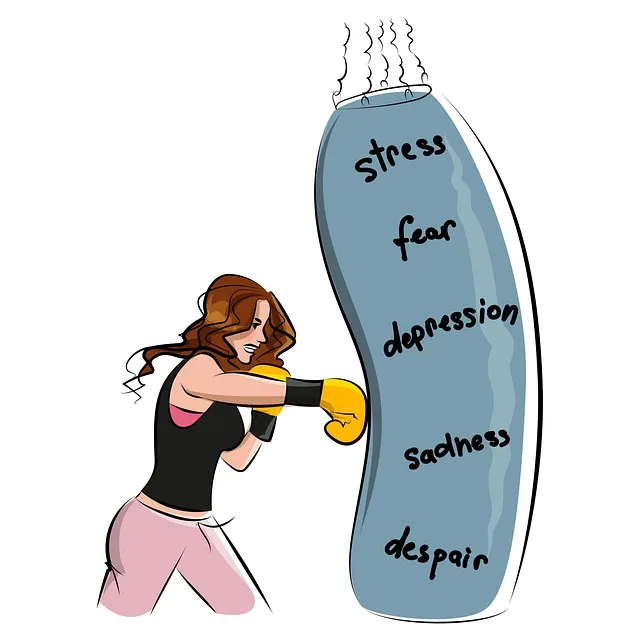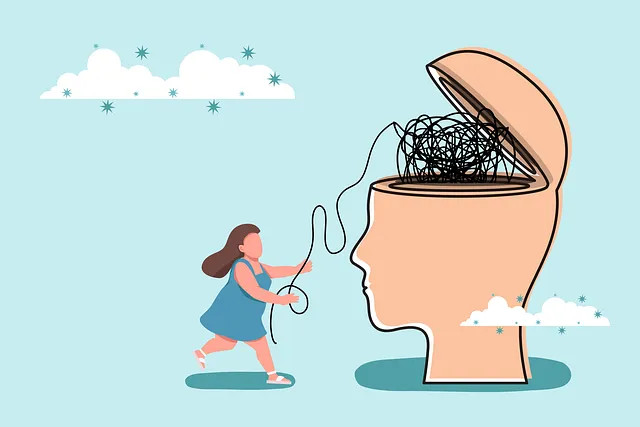Emotional Intelligence (EI), a key driver of well-being, is highly valued by organizations like Kaiser in their inpatient mental health services. As highlighted by Parker et al., effective EI involves self-awareness and regulation, along with empathizing with others. Kaiser's comprehensive approach includes therapeutic interventions tailored to patients and community outreach programs for ongoing support post-discharge. Building EQ through regular self-reflection, mindfulness practices, and mental wellness coaching is crucial for personal and professional growth, especially in healthcare. Success in EI development is measured using tools like the MSCEIT and techniques such as journaling and cognitive-behavioral techniques to track improvements in stress management and emotional responses.
Emotional intelligence (EI) is a powerful tool for personal growth and well-being. In today’s fast-paced world, understanding and managing emotions effectively can significantly impact our relationships and overall success. This article explores the concept of EI, focusing on strategies to enhance it. We delve into the Kaiser Approach, an inpatient mental health service model by Parker, which prioritizes emotional awareness. By examining the building blocks of EI and practical tips, readers will discover how to navigate life’s challenges with greater resilience and empathy.
- Understanding Emotional Intelligence: A Key to Well-Being
- The Kaiser Approach: Inpatient Mental Health Services
- Building Blocks of Emotional Intelligence
- Practical Strategies for Enhancing Emotional IQ
- Measuring Success: Evaluating Emotional Intelligence Growth
Understanding Emotional Intelligence: A Key to Well-Being

Emotional intelligence (EI) is a key component to overall well-being and has been recognized as a vital skill set by many organizations, including Kaiser, in their inpatient mental health services. Understanding EI involves recognizing and managing one’s own emotions, as well as understanding and responding appropriately to the emotions of others—a skill that Parker et al. (2021) highlight as essential for effective communication and strong relationships.
Developing emotional intelligence can be a transformative process, especially for mental health professionals who often deal with complex cases involving trauma. Implementing effective communication strategies and risk management planning, as offered by Trauma Support Services, can enhance these professionals’ EI, enabling them to provide more nuanced care. This, in turn, can lead to improved patient outcomes and enhanced job satisfaction.
The Kaiser Approach: Inpatient Mental Health Services

The Kaiser Approach to emotional intelligence building begins with comprehensive inpatient mental health services. Kaiser, known for its wide-ranging healthcare offerings, provides intensive care for individuals grappling with severe mental health conditions. This approach prioritizes holistic healing by addressing not just the symptoms but also the underlying emotional and psychological needs of patients. Inpatient facilities offer a controlled environment where individuals can focus on their well-being without external distractions.
One notable aspect of Kaiser’s strategy is its emphasis on confidence boosting through therapeutic interventions tailored to individual needs. Additionally, the organization leverages its Community Outreach Program Implementation to connect patients with support systems outside the hospital setting. This dual approach—inpatient care and community outreach—facilitates ongoing emotional regulation, empowering individuals to manage their mental health effectively even after discharge.
Building Blocks of Emotional Intelligence

Emotional intelligence (EQ) is a multifaceted skill that involves understanding and managing one’s own emotions, as well as recognizing and empathizing with others’ feelings. The building blocks of EQ include self-awareness, self-regulation, motivation, empathy, and social skills. By fostering these components, individuals can significantly enhance their interpersonal relationships and overall well-being.
For instance, organizations like Kaiser, known for their comprehensive healthcare services, often emphasize the importance of emotional intelligence in their mental health programs, including inpatient care. This is reflected in their risk assessment strategies for mental health professionals, which aim to prevent issues like depression among staff. Social skills training plays a crucial role in this process, enabling professionals to connect with patients on a deeper level and offer more effective treatment.
Practical Strategies for Enhancing Emotional IQ

Building emotional intelligence (EQ) is a powerful tool for personal and professional growth. It involves recognizing, understanding, and managing one’s own emotions, as well as empathizing with others. For those seeking to enhance their EQ, there are several practical strategies worth considering. One effective approach is engaging in regular self-reflection. Taking time to introspect on one’s feelings, triggers, and responses allows for greater awareness of emotional patterns and potential areas for improvement.
Additionally, mental wellness coaching programs can be invaluable resources. These structured initiatives provide individuals with the tools and guidance needed to develop healthier emotional coping mechanisms and improve interpersonal connections. Incorporating mindfulness practices into daily routines is another effective method. Techniques such as meditation and deep breathing exercises help calm the mind, increase focus, and reduce stress, thereby fostering better emotional regulation. Remember, consistent effort and commitment are key; just like physical fitness, mental wellness requires regular maintenance and exercise to achieve lasting results, especially in preventing burnout among healthcare providers.
Measuring Success: Evaluating Emotional Intelligence Growth

Measuring success in emotional intelligence (EI) development is a crucial step in understanding growth and identifying areas for further improvement. This process involves evaluating an individual’s progress, which can be assessed through various methods. One way to gauge EI is by using standardized assessments like the Mayer-Salovey-Caruso Emotional Intelligence Test (MSCEIT), which provides a quantitative score based on performance. These tests often include scenarios that measure self-awareness, social awareness, relationship management, and emotional resilience—core components of emotional intelligence.
In clinical settings, especially where Kaiser has inpatient mental health services, tracking EI development can be integrated into treatment plans. Self-Awareness Exercises, such as journaling or reflective practices, can help individuals recognize their emotions and triggers. Additionally, promoting Cultural Sensitivity in Mental Healthcare Practice enables professionals to assess and address cultural factors influencing emotional responses. Stress Reduction Methods, like mindfulness or cognitive-behavioral techniques, are also valuable tools for measuring success by observing improvements in managing stress and its related emotional reactions.
Emotional intelligence, a crucial aspect of well-being, can be cultivated through various strategies. The Kaiser Approach offers inpatient mental health services, focusing on building blocks like self-awareness and empathy. By implementing practical strategies and measuring growth, individuals can enhance their emotional IQ, leading to improved relationships and overall success. While the Kaiser approach, with its focus on Parker’s inpatient care, is a notable method, continuous exploration of new techniques ensures that everyone has access to tools for emotional intelligence building.






